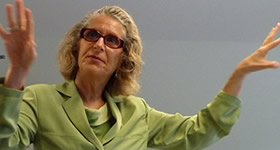Part 3 of a 3-part blog. I hope you read Parts 1 and 2, published on January 18 and January 21 in “Simone Uncensored.” And I will post all three parts as one document in my Free Download Library on this website.
Part 3
I hope you’ve now read Underdeveloped: A National Study of Challenges Facing Nonprofit Fundraising. This study, released in January 2013 by CompassPoint and the Evelyn and Walter Haas Jr. Fund, provides useful information to fundraisers, bosses, and boards.
Lots of people are talking, writing, and blogging about this report. For example, check out the articles in The Chronicle of Philanthropy, January 13, 2013, and in the Nonprofit Quarterly, January 19. Another example: Pam Grow’s well-titled blog, “If you’re not committed to funding your mission, you’re not committed to your mission.”
In summary, here’s the scoop: Development officers quit. Bosses fire development officers. Boards don’t play. Organizations don’t get it. This vicious cycle threatens financing of the sector. And, this has been going on for years and we aren’t really fixing it.
Here are my various and sundry thoughts about fundraisers who don’t know the body of knowledge. I’m always surprised and disappointed when I mention key names in the fundraising world – authors and experts and researchers – and fundraisers don’t know whom I am talking about. I’m disappointed that so many consultants and fundraisers aren’t reading research. The bottom line: I’m worried that professionals in fundraising aren’t continuing their professional development.
I think fund development is a difficult field. You have to know the body of knowledge about fundraising. You have to know the body of knowledge in management and governance and communications and… You have to know “why” not just “how.” You have to know strategy and tactics.
Hiring the right development officer. Read about executive director dissatisfaction on pages 8 and 9 in Underdeveloped. Yes, development officers should be able to conduct prospect research, solicit gifts, enable volunteers to successfully participate, etc. Executive directors should use the CFRE International role delineation (described in the Test Content Outline), to verify what fundraisers need to know.
So don’t hire an inexperienced development officer. Or, if you cannot afford a knowledgeable and experienced fundraiser, consider developing someone from within.
I have successfully helped development officers acquire the skills and expertise to perform better within their institutions. I have helped organizations find a high-performing current staff person who wants to become a development officer. Then through a consultancy and private coaching, that reliable employee becomes a good development officer.
Read Parts 1 and 2 of this 3-part blog…where I share my thoughts (and my pet peeves) about bosses and boards and fundraising. And you’ll find more of my thoughts about bosses and boards and fundraising in my NPQ web column and in my blog “Simone Uncensored.”
A few final thoughts about the Underdeveloped report…
Did you know that professions dominated by women are typically paid less than jobs held by men? Too often, professions dominated by women are disrespected.
I’m curious: How many female development officers are fighting male CEOs and boards often dominated by men? So maybe there is a bit of sexism playing out. I wonder, do bosses and boards listen better to male development officers?
Do you have the right policies and procedures and systems in place to support fundraising? For example, does your organization understand the Donor Bill of Rights and AFP Code of Ethical Principles and Standards of Professional Practice – and adhere to them? Visit AFP for these documents. Do you have a decent fundraising database with a relationship-building focus? For example, check out Bloomerang, the new fundraising database from Jay Love, the founder of e-Tapestry. Bloomerang is based on Adrian Sargeant’s research about donor loyalty. How cool is that?
In conclusion
See page 22 of Underdeveloped. Very nice diagram of the vicious cycle. Good summary of the conditions for success. And pages 23 to 27 list 10 calls to action to “spark conversation and provoke action.” Compare these 10 calls to action with the calls to action in Sargeant and Shang’s Growing Philanthropy in the U.S Report.
We can do this – all of us organizations and executive directors and fundraisers.
Yes, we can do this. More importantly, we have to do this. Otherwise, there won’t be sufficient loyal donors who give gifts. If we don’t do this, organizations will die. If we don’t do this, the nonprofit sector will flounder.
So that’s the end of my various and sundry thoughts about the report, Underdeveloped: A National Study of Challenges Facing Nonprofit Fundraising. This study, released in January 2013 by CompassPoint and the Evelyn and Walter Haas Jr. Fund, provides useful information to fundraisers, bosses, and boards. For all three parts in one article, visit the Fund Development section of the Free Download Library on my website, www.simonejoyaux.com.
Come on. Let’s get it together. We can make change.

